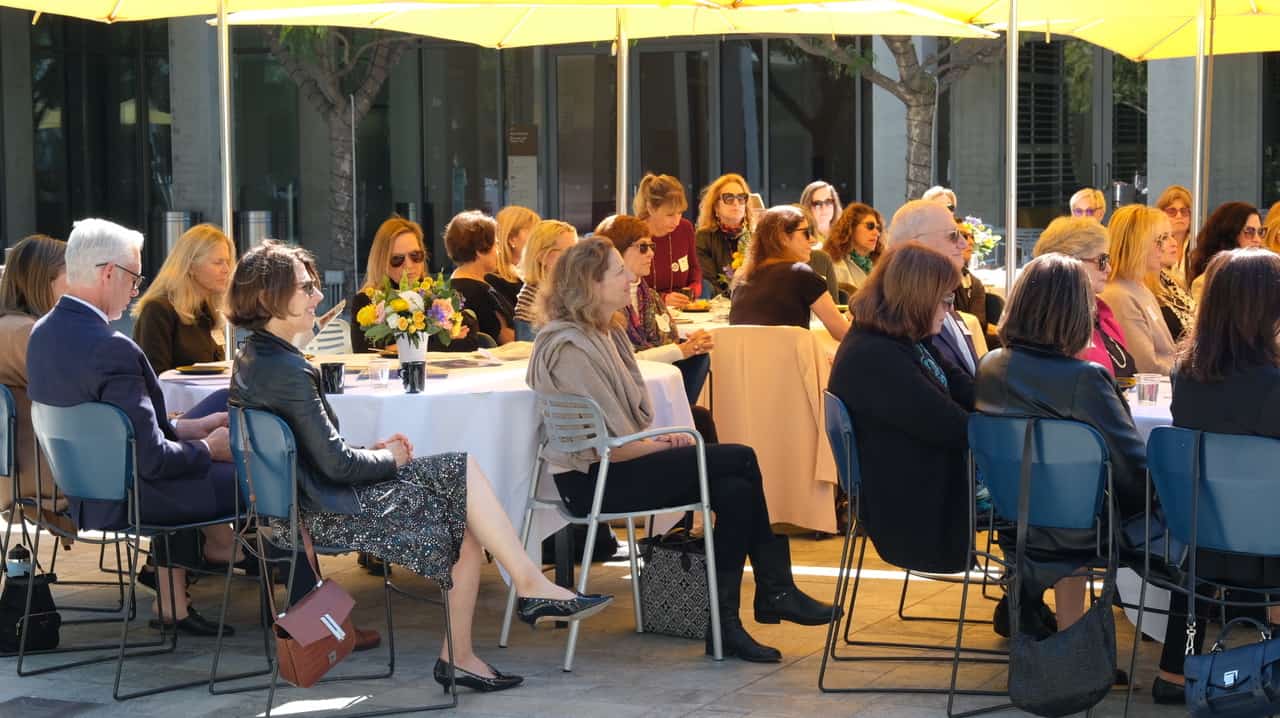
Another Set of Updates from Everychild’s 2020 Covid-19 Emergency Relief Grantees
On April 4th, Everychild members gathered at the Skirball Cultural Center to hear updates from four of the eight organizations that received our 2020 Covid-19 Emergency Relief Grants. Leaders from each of these organizations described how the pandemic affected them, how the funds were deployed, and the challenges they are facing to this day. Previously, in October, we received updates from the other four of our 2020 grant recipients.
The first presenter was Laura Pancake, Executive V.P. and Chief Clinical Officer of Pacific Clinics, who spoke about her organization’s experience ever since they received the phone call from Everychild awarding them of their grant. Pacific Clinics provides behavioral and mental health services to very low-income families. She began by explaining that since their pre-pandemic services had been provided in person 98% of the time, the organization was forced to pivot, literally overnight, to become an online provider. This was challenging, as many families had no computers, no landlines, and no cell phones. With our additional funding, Pacific Clinics was able to conduct a full immediate assessment of all their families and found two primary problems: first, that older children had trouble during their appointments because sheltering in place provided no privacy, and second, that it was difficult keeping the agency’s youngest patients engaged in virtual visits.
The Everychild emergency grant funds were then also used to provide specialized therapy boxes for each age range. For older children, this meant laptops, earbuds, and burner phones. For younger patients, the boxes contained tools for therapy engagement such as games, crafts, cards, and items for play therapy. Pancake said, “This completely changed the landscape of the way that we do work.” And now, two years later, these tools continue to be in place. Today, all of Pacific Clinics’ sites are fully open, and 50% of their clients are back to in-person treatment. They are prepared for future surges because of the measures Everychild helped them take in 2020.
Next, Tamra King, Chief Executive Officer from Harbor Community Clinic, described how when the call came in from Everychild they literally “broke into a woohoo dance at the good news.” Our grant came at an especially critical time for the agency as the pandemic was limiting the number of in-person visits. Over the course of the grant period, they used a portion of our funds to invest in IT infrastructure that helped with pediatric telehealth visits that were critical to keeping staff and patients healthy. By the end of the grant period, 40 percent of their visits were being conducted via telehealth which included mental health telehealth visits, which have been especially important to children. Our funds were also used for PPE and safety/distancing protocols enabling them to safely serve pediatric patients who needed in-person care. PPE expenses included screening all patients and employees before they entered the building, frequent sterilization and disinfection of equipment, use of personal protective equipment, avoiding aerosol-generating procedures, and the purchase of gloves, soap, and other supplies. Harbor Community Clinic served as a major participant in the vaccination efforts in San Pedro, setting up pop-up testing and vaccine clinics for their most at-risk populations. Everychild’s funding allowed Harbor to respond quickly and safely to a rapidly changing situation. King proudly stated that they made it through the pandemic without any permanent layoffs and kept all three of their health centers open. She also noted that they opened the doors of a new facility in February of 2020, which included a fully outfitted community dental clinic. These facilities would not have remained open, she said, had it not been for the adjusted technology, the enhanced safety protocols and new training that were supported by Everychild funding.
Next up was Jennifer Braun, President and CEO, of the Alliance for Children’s Rights, an organization that provides holistic legal and social services for children and young adults in the child welfare system. In 2020, conditions became especially dire for youth in foster care who already experience many hardships. Foster parents were falling ill and even dying in some cases. Visits with biological family members were completely halted. Youths and caregivers were losing jobs, and education was disrupted for many. Furthermore, foster youth who were living in colleges and dorms prior to the pandemic suddenly had no shelter, food or healthcare support, as all of those systems had shut down. As a services-based organization, the Alliance knew that their technology infrastructure was already outdated. But the sudden pivot to virtual services made it even more evident. Initially, they only had six laptops for their entire staff. However, with the Everychild grant, they purchased sixty-one more, updated their decades-old phone system and hired IT services for their organization. This helped them connect to their clients immediately. The new technology also facilitated advocacy in remote courtrooms, virtual hearings and remote school district meetings. Furthermore, adoptions and guardianship programs were able to continue. Originally, adoptions were suspended for a year in March 2020; but through these new remote systems, the Alliance was able to keep them moving forward. Over 1,000 adoptions were completed between 2020 and 2021, including a virtual National Adoption Day with families at home, judges in the courtrooms, and lawyers calling in from laptops. The new technology also helped expand the agency’s education services as they have now been able to share information gathered over the year of virtual legal proceedings with other organizations nationwide through webinars, reaching about 22,000 people nationwide between social media campaigns and educational webinars.
Finally, Matt Strieker, CEO of United Friends of the Children, spoke. His organization focuses on meeting two key needs of older foster youth: housing for those who age out of the system and education from 6th grade through college completion. A good many of their clients in their housing program, traumatized and already living on the edge even before the pandemic, were either losing their jobs from layoffs or were frontline workers risking their lives and health every day by continuing to go to work. He noted that Everychild’s grant was amazing because it happened quickly and went to general operating support. First and most immediately, the agency used the money to set up a small program providing straight cash assistance to their clients. While they had done this in the past, it became a bigger part of their mission during the crisis – even a few hundred dollars could help stabilize a family. Second, they gave out Chromebooks and hot spots. Then they doubled their mental health and therapy budget, helping clients manage and address challenges. They also funneled some money to more in-depth case management, connecting their clients to other resources for schooling, housing, IT support and food security. Lastly, they created themed online gatherings to help connect with clients during isolation. Matt Strieker ended his remarks chuckling with an uplifting message for the morning, “I’m optimistic, because what else can I be? Our clients are not part of the ‘pandemic’s lost generation’ as people say, due to interruptions in education and the toll on mental health because you, at Everychild, are the ones preventing that from happening.”
In sum, when Everychild Foundation elected to pivot during the pandemic from awarding its single, annual $1 million transformational grant and instead divide it into multiple, smaller operational ones, some important systemic transformation happened nonetheless. Our grantees, in large part, used our funding to acquire more technology to reach more of their inaccessible clientele remotely, and it appears that much of this new infrastructure will remain in permanent operation, even in non-crisis times. As a result, many more children, youth and families than ever before will now have ongoing access to services, and, once again, the women of the Everychild Foundation have managed to create an outsized impact with their generosity that will reverberate in the community for years to come. How wonderful is that?
Article by,
Katrina Mohn, Communications Committee
Photography by,
Robin Venturelli, Communications Committee Chair

